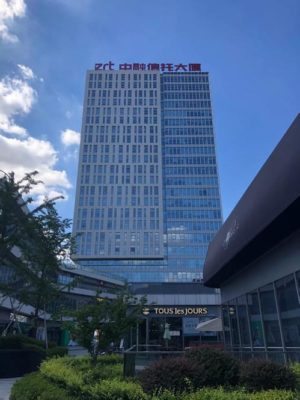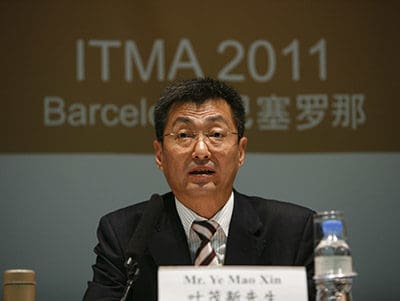 Chinese shadow banking firm, Zhongrong International Trust, has successfully exited from its first income-earning commercial property, selling the Shanghai Zhongrong Trust Building to Shanghai-based Five Bulls Fund for RMB 1.5 billion ($220 million), according to a local news report.
Chinese shadow banking firm, Zhongrong International Trust, has successfully exited from its first income-earning commercial property, selling the Shanghai Zhongrong Trust Building to Shanghai-based Five Bulls Fund for RMB 1.5 billion ($220 million), according to a local news report.
The property in the Daning area of what was formerly Zhabei district has since been renamed as the Five Bulls Holdings Building with Zhongrong touting the deal as a milestone in completing what it terms the “investment-fund raising-management-exit” cycle.
Building Sale Delayed by Company Sale
“Our understanding is that the deal was agreed towards the end of last year, since then the investment market in China has cooled as a result of the financial de-risking campaign that has been ongoing for more than a year,” said James MacDonald, head of research China at Savills.
Since the time of that agreement, however, Zhongrong itself changed hands, after former owner Zhongzhi Enterprise Group (ZEG) agreed in March to sell its controlling stake in the company to Jingwei Textile, a listed subsidiary of state-owned China Hi-tech Group for approximately RMB 1.2 billion.
“Apparently, it was a relatively drawn-out process, something that was seen with many deals involving domestic funds this year,” MacDonald added. Zhongrong and Five Bulls originally agreed on the sale and purchase of the property around the beginning of this year with closing finally taking place in July.
Zhongrong Plays Up Asset Management Prowess

Jingwei chairman Ye Maoxin completed the acquisition of Zhongrong earlier this year
The mainland media were singing Zhongrong’s praises for its investment vision, asset management capability and masterful handling of the deal process following the closing announcement. Zhongrong acquired the 40,000 square meter office project along Jiangchang Road near the Shibei High Tech Park in 2014 for RMB 1 billion from Chongqing property developer, Sincere, when it was still under construction. The shadow bank’s team oversaw the final building process and directed a number of later upgrades creating a new lobby and facade, while upgrading the lifts. It has also put into operation a free shuttle bus to and from the Wenshui Lu station on Line 1.
As the first LEED-certified green construction in the area, the property enjoyed an 80 percent occupancy rate before the sale, compared to an average of 65.5 percent across Shanghai’s decentralized office markets. The building’s value also benefitted from Shanghai’s 2015 merger of Zhabei district into Jing An, which officially moved the asset into one of the city’s most desirable district for offices.
The trust finance firm has become a significant player in China’s market for investment grade properties in recent years, including purchasing Silver Court in Shanghai’s Huangpu district from Singapore’s Mapletree for RMB 3.5 billion in July 2017.
Zhongrong Pursues Value-Add with Chinese Characteristics
Besides the Shanghai development, the company has also converted both the original New Century Grand Hotel in Beijing’s Xicheng district and a Parkson Department Store in Chaoyang district into a pair of LEED-certified Grade A office buildings.
As traditional industries make way for tech-based new economies in the top tier cities and with premium land left in short supply, the aging commercial properties have become hot commodities with fund investors hoping to renovate, reposition and resell well-located but underperforming assets.
Zhou Yisheng, managing partner at Go High Fund reckoned that China’s major cities have more than 100 million square metres worth of property in need of upgrade. “The demand is huge and ample capital will come in,” he told the local media. Go High Fund, one of China’s leading commercial property funds, has itself done up a dozen of renewal projects including the original Danyang Building (丹阳大厦) in Beijing and the China Enterprise Building (中华企业大厦) in Shanghai.
According to Wei Dong, head of research at Cushman & Wakefield Northern China, urban renewal projects are favored by investors for their potentially higher return. She said in an interview that,“Core market vacancy rates for office buildings stand at 10 percent. Currently in Beijing, it’s less than 8 percent; in central districts, it’s only 2-3 percent.”
Wei added that rents generally double for a newly upgraded property, greatly increasing the value of the property as well as the return on investment.
Leave a Reply